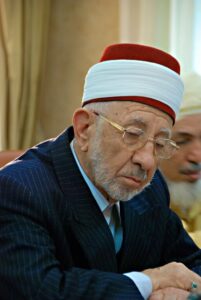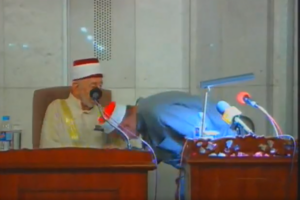“Blessed audiences by Allah SWT. Islam started to spread to Medina in that year. As promised, a group of the Ansar arrived with an envoy of twelve naqib who met at Al-‘Aqabah. This meeting is known as the First ‘Aqabah Agreement (al-‘Aqabah al-Ula)…”
Syeikh Dr Muhammad Sa’id Ramadhan al-Buti that night was teaching Fiqh al-Sirah, a book he arranged himself. The book was first published in 1977 and has been translated into tens of other languages. Zul first learn about the book during his Thanawi studies at SMAASZA and the opportunity to study through talaqqi with the author is something that Zul wouldn’t miss. Zul’s friends from Halab, Salqin who visited Damascus, usually wouldn’t miss the opportunity to attend his classes. Furthermore, various races from amongst the Arabs and non-Arabs will always attend his lessons.
“Dakwah that we understand in Sirah of the Prophet PBUH is showcased by, for instance, our excellent scholar in Syria, Syeikh Badruddin al-Hasani. There was a time when Syeikh Badruddin al-Hasani was given a gift from the government of Uthmaniyyah, Turkey at the time. Later, he distributed the money by dividing them and placing them into small pouches which were then handed out by his students to the prostitutes.”
His speech is clear, beautiful and eloquent, which made it so that people were interested and captivated to listen to his sermons. After carefully correcting his microphone, he continued the narration again, “Syeikh Badruddin al-Hasani even asked his students to send his regards and salam to them (the prostitutes) and request for them to supplicate for the Syeikh so that he will be saved in this world and the hereafter. Upon hearing the request, all the prostitutes patted their foreheads and said, “Syeikh who is a pious, knowledgeable, zuhud and a person who always worship ask for our supplication!” They then repented and turn into pious women.” Zul carefully and attentively wrote down the story in his notebook. The Tenkiz Mosque was packed with people however, it didn’t distract him from Syeikh al-Buti’s class. He was lost, captivated in the in-depth Sirah discussion, but it is current and corresponds with today’s reality. Such is the uniqueness of the speech of Syeikh al-Buti.
“I’ve been reading this book for such a long time, Li. From my high school years of Thanawi. When I was in Medina, every time I went to a book fair, I will surely buy Syeikh’s book!” Zul said to Azli. At the time, Zul had just bought a bicycle to make it easy for him to go anywhere to attend any religious classes.
****************

Dr Syeikh Muhammad Ramadan al-Buti is originally from the village of Jilka, in the Butan island, a territory of Anatolia, which is currently located in Turkey since the year 1929. After staying there for four years, his father emigrated and then moved to Damascus. His father was uncomfortable with the Turkish rule at the time which was under Mustafa Kamal Ataturk who had just overthrow the Ottoman empire at the time.
His mother passed away when he was 13 years old and his father then remarried a Turkish woman. Hence, it is not surprising that he is fluent in Turkish, Kurdish which is also his mother tongue as well as Arabic. It is also said that Syeikh can deliver his speech in English. He is a knowledgeable, zuhud, warak and pious man who holds firmly on Islam.
In the beginning, his father would teach him and afterwards, when they were in Damascus, he gets acquainted and met with great scholars such as Al-Allamah Syeikh Hasan Habannakah al-Maidani, a scholar and mujahid of madhhab Syafie who is famous for his knowledge and bravery. In the year 1953, Syeikh al-Buti completed his high school studies at Maahad at-Tawjih al-Islami which was managed by Syeikh Hasan Habannakah.
Once, in a sermon, Syeikh al-Buti narrates, when a group of Syeikh Hasan Habannakah students were sent to pursue their studies at al-Azhar University, Syeikhul Azhar Syeikh Muhammad al-Khidr Husain sent Syeikh Hasan Habannakah a letter. Among the contents of the letter states: “Indeed, you have sent us teacher and not students.” Such is the incredible distinction of Syeikh Hasan Habannakah and his students who were taught under him that they impress Syeikhul Azhar.
Syeikh al-Buti entered the Arabic Language Faculty at al-Azhar University and attained an Education Diploma at the end of the same year. Next, Syeikh continues his studies for Doctor of Philosophy at al-Azhar University and completed it in the year 1965.
*****************
One morning, Zul was talking with Syeikh Taufiq Ramadhan al-Buti, Syeikh’s son. In the Mediterranean weather in winter, the wind starts to blow. Zul’s cheeks were lightly hit by the shivering cold wind. The book written by Syeikh al-Buti titled Kubra al-Yaqiniyyat al-Kauniyyah is in his hand.
“Syeikh Taufiq. What is the true character of your father?” Zul asked Syeikh Taufiq. Both of them get to know each other when they met in a sermon by Syeikh al-Buti.
“My father has a special room of which he will always be inside it. I never see him except him studying, writing and composing or praying and reciting zikrullah. I’d rarely see him sleep…,” Syeikh Taufiq describes regarding his father enthusiastically.
“One day, I’d very much want to bring your father to Malaysia. I’ll act as his translator. Malaysians should be introduced to great scholars like him.” Zul said to Syeikh Taufiq who nodded in agreement and smiled, happy with the spirit the young man in front of him show.
******************
Zul was studying the Hikam book that he learned from Syeikh al-Buti. There is as though an invisible force that pulled him towards it and continues to study one by one of its wisdom in the lesson of Hikam Ibn Ata’illah al-Sakandari taught by Syeikh. Through Zul gets to know Ibn ‘Ajibah, Syeikh Zarruq, Abi Madyan, and modern scholars who discussed it such as Syeikh al-Syarnubi. Not to forget, Syarah Hikam Tokku Pulau Manis that he first discovered during his studies in SMASZA.
The first time Syeikh al-Buti held a class of Hikam Ibn Ata’illah al-Sakandari is at al-Senjikdar Mosque in the year 1974. Later, the Hikam lesson moved to Tenkiz Mosque when Zul was in Damascus. In one of his lessons, Syeikh told them of how the writing of his Syarah Hikam was stalled for he couldn’t understand one of the pearls of wisdom stated by Ibn Ata’illah al-Sakandari.
The writing process of Syarah al-Hikam was then put on pause. In his heart, he whispered, “Maybe the meaning of the wisdom transcends me, it is beyond my understanding.”
Not long after that, he was invited to attend an international conference in Egypt. During his visit, Syeikh took the opportunity to visit the tomb of Ibn Ata’illah al-Sakandari and prayed there. After reciting several surahs of the Quran at the tomb of Ibn Ata’illah al-Sakandari, he then supplicated. Among the matters he supplicated for are:
اللهم الهمني المعنى الذي أراده ابن عطاء الله بهذه الحكمة واكرمني بعلم من علمه حتى أدرك معنى هذه الحكمة
“O Allah, reveal to me what Ibn Ata’illah meant of his wisdom and honour me with knowledge from the knowledge that I can understand the meaning of this wisdom.”
As soon as he returned to Damascus, Syeikh resumed the writing of syarah al-Hikam al-Sakandari which was put on hold. With the will of Allah, it was made easy for him and he was able to write 10 pages starting in the morning till the evening.
*********************
“In a garden, there are a lot of trees, some are big and some are small. They were happy and joyful. Suddenly, one day an axe head fell and the trees there begin to cry out of fear. For surely, they’ll get cut down soon.
They decided to meet with the oldest and wisest tree to detail the predicament they are in. The old tree who has a lot of experience simply said: Don’t be scared and don’t cry. Indeed, the axe’s head can never harm you for as long as none of you gives him your branch to be made its handle.”
It was a simple story that Syeikh narrated, but it penetrates deep inside Zul’s heart. This is the cause of every issue; the fragility of the unity in the Muslim ummah. Muslims all over the world is currently facing the issue of unity. It is also the issue that has been repeated by Maulana Abu al-Hasan Ali al-Nadwi in his books.
Zulyadain’s voice disrupts Zul’s thought. “Ustaz Zul! Can I learn Hikam from you…?”

